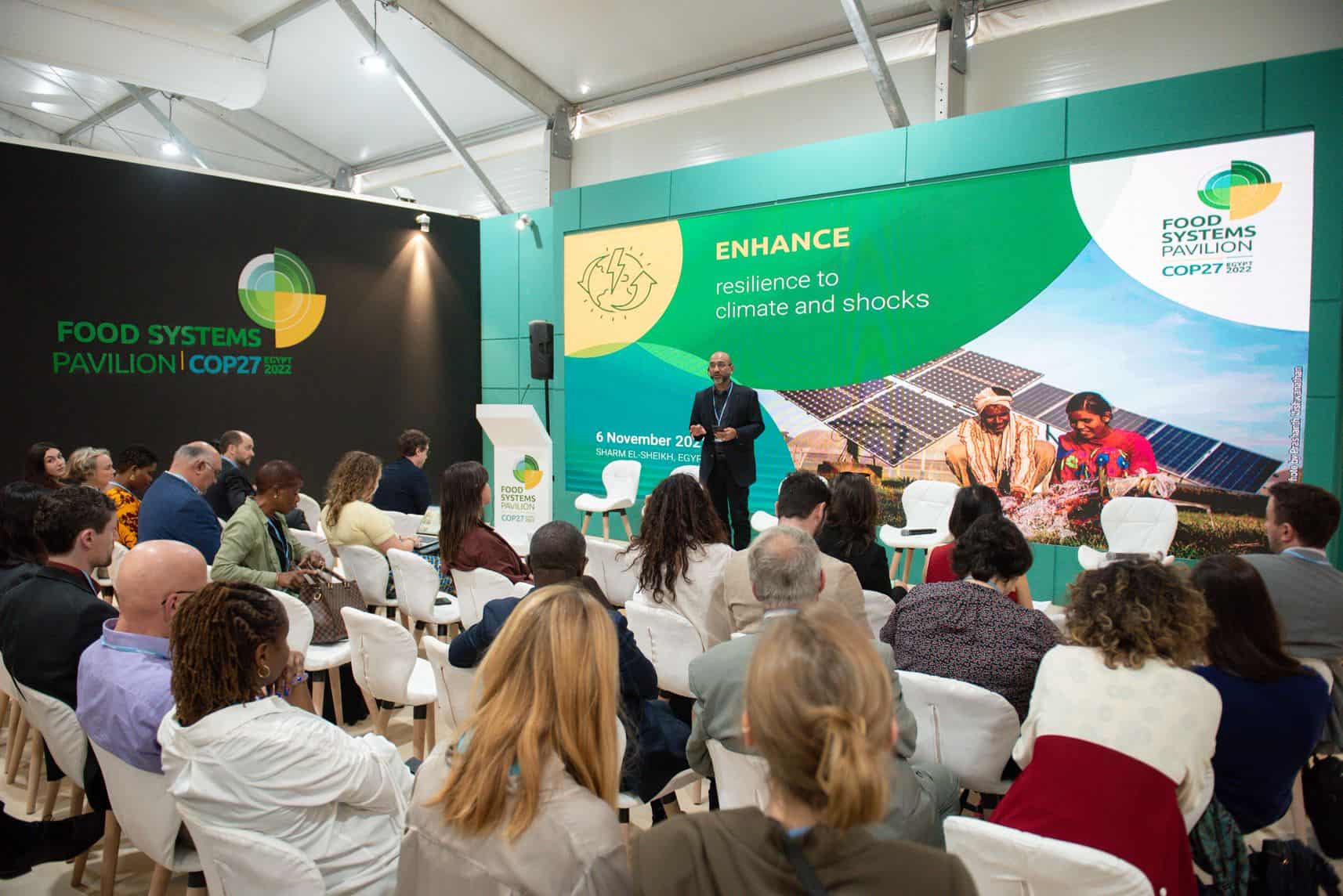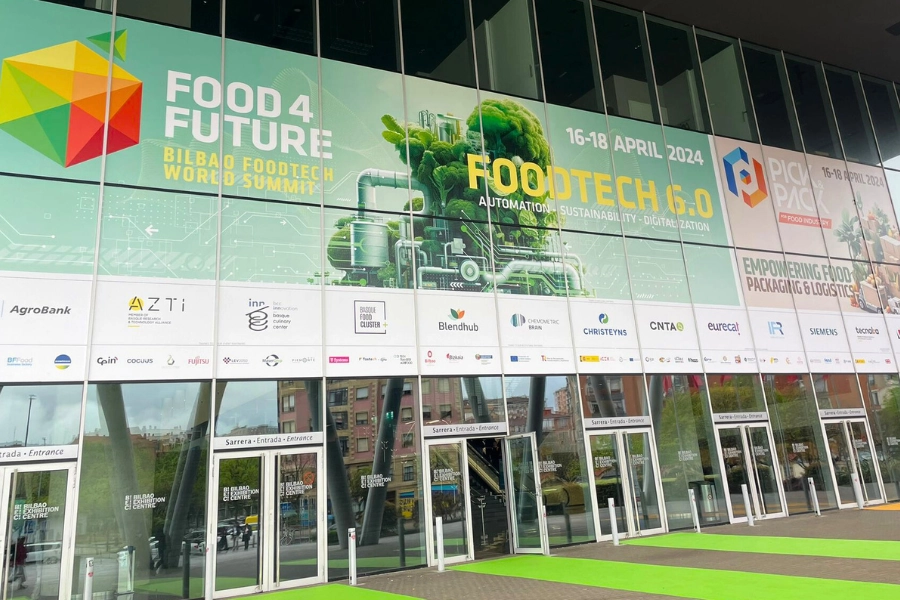Why we need action on food at COP27

We’re one week into COP27 in Egypt, and so far we’ve seen mixed outcomes. There have been positive signs, including new pledges on climate finance and loss and damage, but WWF has nonetheless warned of limited progress on critical issues. Themed days across the first week have included Finance, Youth & Future Generations, and Decarbonisation. This weekend, on Adaptation & Agriculture Day, farming and food are getting their time in the sun. With agriculture overlooked when it came to flagship themes at COP26 last year, its recognition in Sharm El-Sheikh is an important acknowledgement of the impact that food production has on nature and the climate and the fact that transforming our food systems is vital in mitigating future climate change and increasing our resilience to locked-in warming.
What do food systems have to do with climate change?
Our food systems are powering the climate crisis, generating one third of greenhouse gas emissions. The way we produce, transport, consume and waste food is decimating nature, degrading soil and polluting water supplies.
Yet it’s our food producers that are the most impacted from floods, droughts and other extreme weather events. The World Bank found that agricultural workers make up the majority of those classed as ‘poor working adults’ and experts predict that crop yields could be halved by 2050 in certain regions, the majority of which are in the Global South.
“Food is at the heart of climate action – we can’t keep climate in check without changing how we produce and consume food,” says Cristina Rumbaitis del Rio, Senior Adaptation and Resilience Advisor at the Food and Land Use Coalition. “The impacts of climate change are mounting everyday – we must also take action to build resilience globally.”
What is being done at COP27 to reduce the impact of food production on the environment?
In order to address these issues publicly and push them up the political agenda, a coalition of leading international food organisations has joined forces to host the first ever Food Systems Pavilion at COP27, bringing together food producers, youth groups, Indigenous Peoples, NGOs, businesses and governments.

Picture of the Food Systems Pavilion at COP27
Harnessing these diverse perspectives offers the potential to super-charge a just transition, with Pavilion partners committing to work collaboratively to scale solutions, tackle trade-offs and overcome barriers.
“New visions are needed for how food systems will operate in the future, including the central role of farmers and small-scale agriculture as positive agents of change”, says Dr Dhanush Dinesh, founder of Clim-Eat, one of the Food Systems Pavilion co-hosts.
“More of the same will just give the same results,” he explains. “This COP, we need new ideas, partnerships and inspiration to change the game and transform food systems. This is what the Food Systems Pavilion seeks to do.”
“We intend to put food at the centre of the table at COP27, as a critical link between peoples and cultures, as well as climate change, nature loss, and human health,” adds Andy Zynga, CEO of EIT Food, another co-host. “Through sessions spanning every element of the discussion on sustainable food systems, the Pavilion will capitalise on the rising awareness of food systems and agriculture issues to catalyse more partnerships and incite commitments to transform the food system.”
Was there progress on food and agriculture at COP26?
The previous COP, hosted in Glasgow, was widely criticised for failing to pay adequate attention to the critical role of food and agriculture in reducing greenhouse gas emissions. But hopes are high that food will play a defining role at COP27.
Dr Agnes Kalibata, President of the Alliance for a Green Revolution in Africa, has urged policymakers to take note. “We must ensure that food dominates the COP27 agenda. It has been the missing piece in climate negotiations for far too long. Timely action on food systems is essential to stop more people from sliding into poverty and food insecurity.”
What are the initiatives to look out for at COP27?
The good news is that food systems are finally getting the look-in they deserve. Multiple actors and initiatives are working to move food to the top of the COP27 agenda. This includes the Egyptian COP27 Presidency Initiative ‘Food and Agriculture for Sustainable Transformation’ (FAST). Focused on governance, and based on three pillars of action – knowledge, access to finance, and policy dialogues – the initiative will be instrumental in helping delegates recognise the role food systems play in securing a healthy future.
Meanwhile, the Koronivia Joint Work on Agriculture (KJAR) is a landmark decision under the United Nations Framework Convention on Climate Change (UNFCCC) that recognizes the unique potential of agriculture in tackling climate change. It addresses six interrelated topics: soils, nutrient use, water, livestock, methods for assessing adaptation, and the socio-economic and food security dimensions of climate change across the agricultural sectors. KJAR is expected to make strides towards implementation at COP27, as per the Egyptian Presidency’s official slogan.
What is the Food Systems Pavilion calling for at COP27?
While these initiatives show promise, we’re still a long way off where we need to be. What’s clear is that we need to radically rethink our food systems in order to feed the world without consuming the planet. How we do that – at speed and scale, without leaving anyone behind – is a question to which there are no simple answers. But the Food Systems Pavilion represents a huge opportunity to galvanise action and accelerate inclusive systems innovation. Together, the partners involved have developed a set of policy asks by which to judge the success of COP27 for food systems. All relate to the implementation of important commitments made prior to COP27 to improve food systems globally:
1. Enact and implement more detailed, ambitious and specific food systems transformation commitments in Nationally Determined Contributions (NDCs) – these are the commitments countries make to action that will help us achieve the goals of the Paris Agreement.
2. Develop a comprehensive programme for the next phase of the Koronivia Joint Work programme on Agriculture.
3. Deliver a major package of climate finance for food and agriculture, that includes a strong focus on finance for adaptation and smallholder farmers, with at least 20% of new financial commitments to adaptation, resilience-building and loss and damage focused on food systems.
4. A commitment by the UNFCCC to work with other UN agencies on addressing the fragility of the global food system, global food security and chronic malnutrition, particularly in conflict-affected states, and with particular attention to women, children, and other highly vulnerable groups.
As a team, we are proud to be supporting this unprecedented collaboration and helping to amplify the call for a just transition to sustainable food systems. To find out more and get involved, visit FoodSystemsPavilion.com, search #ActionOnFood and follow the story on our social channels.

Graphic explaining what the Food Systems Pavilion is calling for
Liked this? Read more about COP27 in our other recent blogs:


